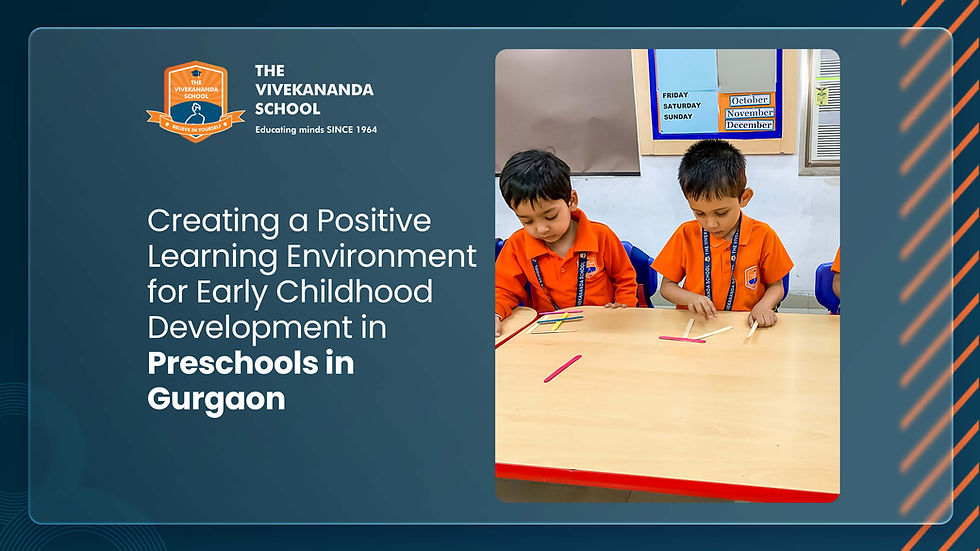What is the Early Childhood Education Curriculum You Should Know?
- The Vivekananda Admission
- Oct 12, 2025
- 3 min read

When you see your child take their first steps, you begin imagining them heading off to school and eventually college. This journey starts with playgroups and early childhood education as a whole. A building stands strong when built on a solid foundation, and the same applies to every human being, it all begins in childhood. Let us now dive into what we should know about the early childhood education curriculum.
Understanding Early Childhood Education Curriculum
Early childhood education (ECE) focuses on the developmental period from birth to around eight years old. At The Vivekananda School, our curriculum for preschoolers and early graders is carefully designed to balance structured learning with free exploration, ensuring every child grows holistically.
For admissions: Day Care, Playway, Prenursery, Junior KG & Senior KG Call +91 8800902881
Here’s what it encompasses:
1. Cognitive Development
As one of the best play schools in gurgaon we engage children in age-appropriate activities like puzzles, counting games, dienes blocks activities, abacus for kids and storytelling to enhance their memory, problem-solving skills and logical thinking.
2. Language & Communication Skills
Through phonics, rhymes, role play, and interactive reading corners, children learn to express themselves confidently in English and Hindi, setting the stage for fluent communication.
3. Social & Emotional Growth
Our classrooms and playgrounds are safe spaces for learning teamwork, empathy, and conflict resolution, skills that last a lifetime.
4. Creative Expression
Arts, music, and dance aren’t just extracurricular—they’re an essential part of the curriculum. They allow children to explore their imagination and develop self-expression.

5. Physical Development
From sports to free play in thoughtfully designed outdoor spaces, children develop coordination, balance, and a lifelong love for fitness.
6. Life Skills & Values
Rooted in the teachings of Swami Vivekananda, our curriculum instills discipline, respect, responsibility, and a sense of community from the very start.
Area of Development | How It’s Nurtured at The Vivekananda School |
Cognitive Development | Age-appropriate activities such as puzzles, counting games, Dienes blocks, abacus exercises, and storytelling to strengthen memory, problem-solving, and logical thinking. |
Language & Communication Skills | Phonics, rhymes, role play, and interactive reading corners in English and Hindi to build confidence in expression and communication. |
Social & Emotional Growth | Safe classrooms and playgrounds for teamwork, empathy, and conflict resolution, shaping lifelong interpersonal skills. |
Creative Expression | Arts, music, and dance integrated into the curriculum, encouraging imagination, creativity, and self-expression. |
Physical Development | Structured sports and free play in well-designed outdoor spaces to enhance coordination, balance, and a love for fitness. |
Life Skills & Values | Teachings inspired by Swami Vivekananda instill discipline, respect, responsibility, and community values from an early age. |
Why The Vivekananda School’s Approach Stands Out
Play-Based Learning: Children learn best when they are engaged and happy, so we ensure lessons are fun, interactive, and hands-on.
Safe, Stimulating Environment: Bright classrooms, a traffic park for experiential learning, and wellness-integrated spaces make every corner an opportunity to grow.
Parent Partnership: We believe in working hand-in-hand with parents to support each child’s unique journey.
Focus on Holistic Development: We give equal importance to academics, arts, sports, and values, ensuring balanced growth.
The Foundation for a Lifetime of Learning
The early childhood education curriculum at The Vivekananda School isn’t just about preparing children for Grade 1, it’s about preparing them for life. By combining academic excellence with character building, we create confident learners who are ready to explore the world
Because when the foundation is strong, the possibilities are endless.
.png)




Comments